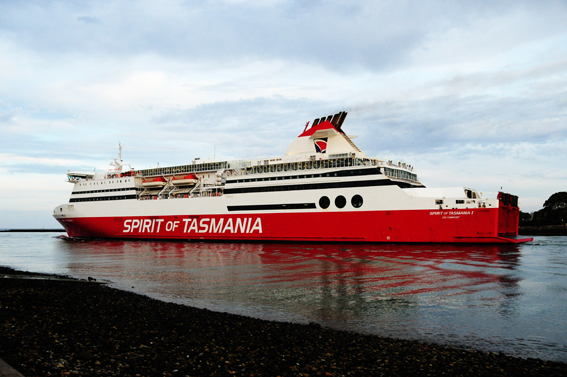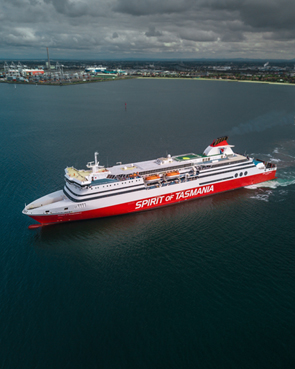She Departed, She Arrived
Written by Saul Latham.
She was in the wind from the south, under the wings of seagulls – pure seagulls that floated quietly in natural sophic essence. Underneath, she was the atmosphere of the near-complete moon, of clouds decorated by light rays beamed from a carnival in the vivid heart of a Melbourne night. In port was the Spirit of Taz, now behind its scheduled departure time of 8:30 p.m.
She waited in the car, first hearing, then seeing three motorbikes and another eight nipping past her window, through the lanes of eager humming vehicles that queued on the pier. Above, on deck, a shadowy silhouette stood looking out over hurried customs attendants who crackled “checks” and “rogers” over the radio.
“No fresh fruit or veg?” asked the turbaned official leaning into the car. “No apples allowed?!” thought Pappa with a quizzed expression – “We’re going to the apple isle after all!” He looked across to her with a straight comedic glare. She laughed to herself then, through the rearview mirror, saw a driver eating what looked like a very tasty donut that disappeared in seconds.
Wave’s lips broke into sinking songs of white from the depths of the water, reflecting sharp oranges and blues that wobbled in sporadic turns. Now the night sky was tempered with the semblance of a bright day and the distant rumble of fireworks echoed over the water from the city’s festival. The Spirit was now an hour late.
The Spirit of Taz had know troubles over the years: It had been in the news for mismanaging polo ponies and been accused over the death of dogs.

“The old ship was once called the Princess,” said Pappa proudly. “She was replaced by another called the Empress. Then we got the Spirit. Once there were three Spirits, but no one used the one to Sydney. So now there’s just two.”
The large colony of seagulls left calmness and appeared as snowflakes crowning the bridge, chirping and squealing, anxiously anticipating the ship’s departure.
“It’s not a competition,” she joked in a memorized cheek.
“It’s definitely a competition,” said Pappa, frustrated by the vehicles moving on in the next lane: the big American truck and glamping trailer, the blokes pulling a fishing boat, and the long-haired hippies in a colorful bus. Near the end of the line, Pappa’s little blue Hyundai finally ramped up onto the stern and into a great steel stowage area. It echoed with engines, the appeals of dogs in brig-esque cages, and an announcement from Captain Davis, “… forecast winds of 15 to 20 knots and a low swell of one and a half meters.” It was now 10:02 p.m. and the Spirit was still docked.
In cabin 8012, they settled into their berths. Out the cabin window was the world, but inside the cabin was their world. After a wash, they rested for a while, examining the oddities and features of it all. Lying on his back, facing the dead white ceiling, Pappa wondered how long he could last on a ship like this. Then with a jolt and a jar, the port’s lights moved slowly out of sight. It was 10:37 p.m., and the Spirit, now departed, began slicing through the cold waters, heading south to rough Bass Strait.
Now, they moved into the public area on deck seven and observed: the two house pinots like orbs in a hand, a Mexican beer overflowing onto a crossword puzzle, TV sets (on one a thriller, another national news, and the other an actor with a tiny mustache saying, “No one understood me”). Out of the gaming lounge stumbled a face as pale as one shocked by a ghost. Stephanie nibbled slowly on salted crisps and listened to a group of boisterous, heavily accented motorcycle pilgrims traveling for a tenth anniversary tour of the island state. The area was busied by a thousand words a minute from conversations at every table. She heard a group of grey-haired men talking about government, law, a spirit, and perfection – she thought the crisps were perfection.
At 11:07 p.m., there was a notification from Captain Davis over the speaker: “Dear passengers, we do apologize again for the late… members… of my crew…” the line crackled and much of what he said was not heard. “We do take seriously… concerns… wish… the Spirit… see the coast…”
The animated banter of the motorcycle group subsided into a puzzle of bewildered looks and hesitant chuckles. Seconds later, they soon forgot and began debating the theme for the club’s tenth anniversary party.
“Pappa, is there a ghost on our ship?” said Stephanie, suspended between excitement and fear. She could see in Pappa’s reaction, his existential limbo was not too different from hers. “Time for bed, Stephanie,” he replied softly.
That night, the ship swayed and Stephanie felt sick. Pappa had suggested, “Concentrate on your breathing,” and so she did. Soon enough, the evening’s drama faded as she passed into sleep, her sickness eased, and the swaying flattened. The next morning was seared orange by a rising sun on the horizon. Into it emerged the coastal hills of northern Tasmania, hovering like clouds in the obscurity of light. From the south, a reliable wind howled through the Spirit as it passed quietly and closely by the front yards and lounge rooms of the bay. Devonport slept under the blanket of Sunday morning, and she was there with the people, in their dreams.
THE AUTHOR
Saul Latham is a writer/journalist from Tasmania, Australia, who lived in Gwangju once – part of him is still there, cycling downtown beside the Gwangju Stream on a glorious day.







